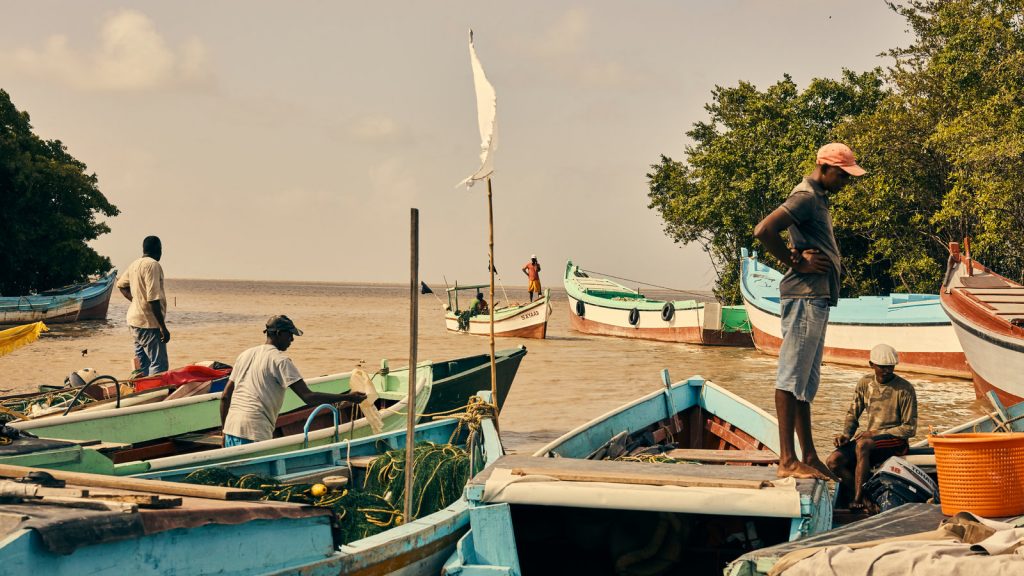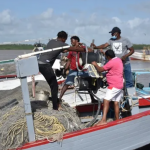
Professor at the University of British Columbia, Dr. Janette Bulkan believes that oil company ExxonMobil and other operators within the Petroleum Industry are being “given free rein” by the Guyanese Government to dominate the country’s marine space, thereby, superseding the legal and customary rights of fishers.
The situation, she said, has resulted in a further decline in fish catches – affecting an industry with a population of approximately 5,000 fisherfolks.
Dr. Bulkan, who was at the time delivering a presentation at a Guyana Symposium in Queens, New York on Saturday, said in addition to climate change, and pollution, petroleum activities within Guyana’s Exclusive Economic Zone (EEZ) are undoubtedly contributing to a low catch.
The Government has repeatedly denied that claim.
While debating a motion on the need for full liability coverage for petroleum related disasters in July, Minister of Natural Resources, Vickram Bharrat ruled out the notion that oil and gas activities offshore were contributing to a further decline in fish catches, contending rather that there should be an increase in yield.
But Professor Bulkan said it would be naïve to think that drilling and exploration activities in Guyana’s EEZ would not negatively impact the environment, more so the Fishing Industry. She submitted that the activities are disrupting the vibration routes of the fish, shrimp and large marine mammals including Red Snapper, Trout, Bangamary, Seabob and Shrimp. Additionally, she said tonnes of toxic waste is being discharged into the ocean which is another cause for concern.
“We would be naïve to think that there is no impact on marine life, sea life within our ocean,” she posited.
Cognizant of the decline in catches, President Irfaan Ali, last May, announced a one-off grant for fisherfolks, but he was keen on pointing out that it was a global problem, and not one unique to Guyana.
But Professor Bulkan said fisherfolks want more than just “handouts,” as she called for them to be properly compensated for their loss.

“They should be compensated; [when] sugar was nationalised and bauxite…compensation was paid…fishers need just as equitable compensation because they had prior rights, generational rights, and customary rights, and they feed us,” she said.
The British Columbia Professor who has been critical of the ExxonMobil operations in Guyana underscored the need for an integrated marine spatial plan. “If there is no integrated plan, then the strongest people, in this case the petroleum companies, they will dictate the terms of engagement,” she reasoned.
She reminded that Article 13 of the Constitution requires that there be increasing opportunities for citizens’ participation in the management and decision-making process of the State, particularly in areas that affect their well-being.
Professor Bulkan said while fishermen and women are required annually to pay for a range of licences, such as, their boat registration licences, captain and jackman licences and fish pen licences, there is need for the industry to be properly regulated by the Government as is the case in Suriname.
“They would like structured discussion; a multistakeholder process that includes them; an end to stop gap measures; an end to handouts and hampers; a plan to save the sea and the fishes and to have regulated sustainable fisheries,” she said.
Professor Bulkan said fishers want a future for their children that goes beyond hand-to-mouth.
“They want to be recognised as champions, sentinels of the ocean, to participate in monitoring of fish population; to act as tour guides for coastal population and visitors,” she added.
In the absence of a timely intervention and effective regulations, Professor Bulkan questioned what legacy Exxon and other operators with the Oil and Gas Industry will leave when the wrap operations in Guyana decades down the road.
“Will its legacy be a polluted and degraded Atlantic?” she questioned.
In the interim, she urged persons in the diaspora to help fishers to become more organized through the formation of associations; support training particularly in the area of tourism with the help of Iwokrama International Centre for Rainforest Conservation and Development, and the Guyana Marine Conservation Society, in addition to training in safety, first aid, and coastal biodiversity training.
Presentations were also made by Dr. Tarron Khemraj, Christopher Ram, Dr. Vincent Adams and Red Thread on a number of oil related topic including insurance coverage and the use of the Natural Resource Fund.











You must be logged in to post a comment Login